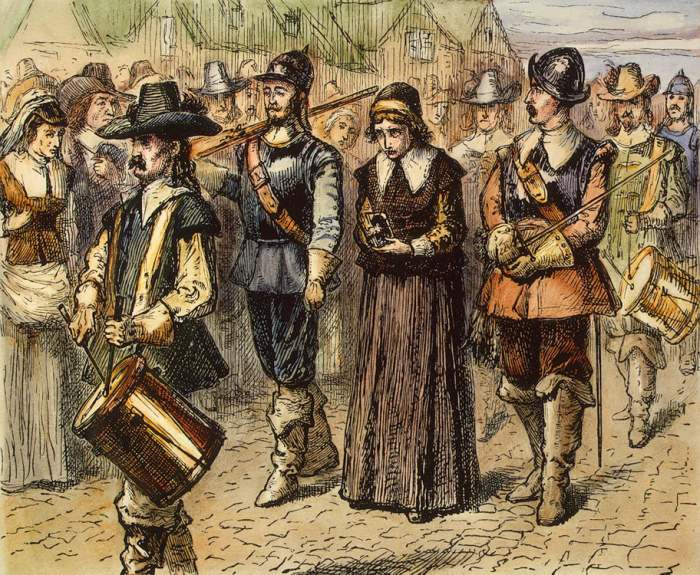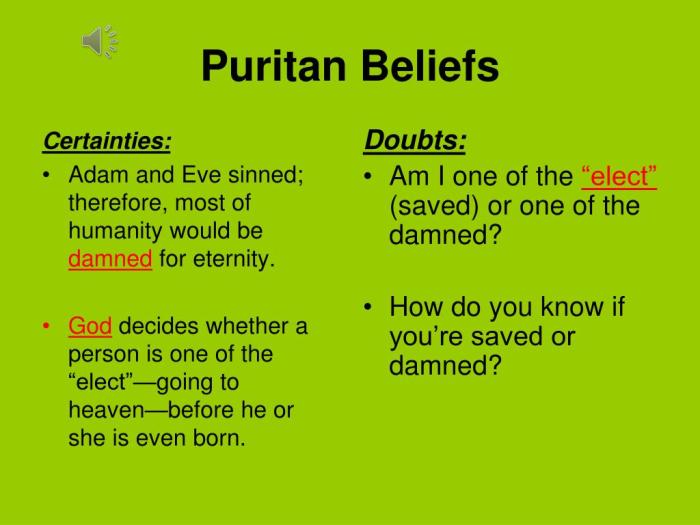Which of the following beliefs was advanced by the Puritans? This question delves into the multifaceted belief system of the Puritans, a religious movement that emerged in England during the 16th and 17th centuries. Their beliefs encompassed various aspects of human existence, including sin, salvation, government, education, and gender roles.
Puritan beliefs were deeply rooted in the concept of human sinfulness and the need for salvation through divine grace. They emphasized the importance of literacy and education, viewing them as essential for understanding religious texts and leading a virtuous life.
Furthermore, Puritans believed in a theocratic form of government, where civil laws were based on religious principles.
Puritan Beliefs on Human Nature
Puritans believed that humans are inherently sinful and corrupt. They saw human nature as tainted by original sin, the belief that all humans are born with a sinful nature due to the disobedience of Adam and Eve in the Garden of Eden.
This belief led Puritans to view humanity as fundamentally flawed and incapable of achieving salvation on their own.
Morality and Behavior
The Puritan belief in human sinfulness had a profound impact on their views on morality and behavior. They believed that humans were prone to evil and needed to constantly strive against their sinful nature. This led to a strict moral code that emphasized self-denial, discipline, and the avoidance of worldly pleasures.
Practices, Which of the following beliefs was advanced by the puritans
Puritan practices reflected their belief in human sinfulness. They emphasized self-examination, public confession, and the need for constant repentance. They also practiced strict discipline, both within their families and in their communities.
Puritan Beliefs on Salvation

Puritans believed in the doctrine of predestination, the idea that God had predetermined who would be saved and who would be damned. They believed that salvation was not based on human merit but on God’s grace. This belief led Puritans to focus on the importance of seeking God’s favor through prayer, repentance, and good works.
Religious Practices
Puritan religious practices were shaped by their beliefs about salvation. They emphasized the importance of preaching, prayer, and Bible study. They also believed in the power of the Holy Spirit to convert and sanctify believers.
Social Structures
Puritan beliefs about salvation also influenced their social structures. They believed that the church was the visible body of Christ on earth and that it was responsible for maintaining the purity of the faith. This led to the establishment of a strict moral code and the use of discipline to enforce it.
Puritan Beliefs on the Role of Government
Puritans believed in theocracy, the idea that God should rule over society through his chosen representatives. They believed that civil law should be based on the Bible and that the government had a responsibility to enforce morality.
Political and Social Policies
Puritan beliefs about government influenced their political and social policies. They established laws that prohibited gambling, drinking, and other forms of immorality. They also believed in the importance of education and established schools to teach children the Bible and other subjects.
Laws and Punishments
Puritan laws and punishments reflected their views on government. They imposed harsh penalties for crimes such as adultery, blasphemy, and Sabbath-breaking. They also believed in the use of public humiliation as a form of punishment.
Puritan Beliefs on Education: Which Of The Following Beliefs Was Advanced By The Puritans

Puritans placed a high value on literacy and education. They believed that education was essential for understanding the Bible and for living a moral life. They established schools to teach children the basics of reading, writing, and arithmetic.
Human Nature and Salvation
Puritan beliefs about human nature and salvation influenced their approach to education. They believed that education could help to curb human sinfulness and prepare individuals for salvation.
Schools and Practices
Puritan schools were often run by ministers and emphasized the study of the Bible. They also taught practical subjects such as farming and trade. Puritan educational practices included the use of memorization, recitation, and public speaking.
Puritan Beliefs on Gender Roles

Puritans believed in the traditional roles of men and women in society. They believed that men were the heads of their households and that women were responsible for raising children and managing the home.
Family Structures
Puritan beliefs about gender roles influenced their family structures. Men were expected to be the breadwinners and leaders of the family. Women were expected to be submissive and obedient to their husbands.
Writings and Practices
Puritan writings and practices illustrate their views on gender roles. The writings of Puritan ministers such as John Cotton and Increase Mather emphasized the importance of male authority and female submission. Puritan practices such as the use of head coverings for women reinforced the idea of male and female roles.
FAQs
What was the central tenet of Puritan beliefs?
The Puritans believed that humans were inherently sinful and corrupt, and that salvation could only be achieved through divine grace.
How did Puritan beliefs influence their approach to education?
Puritans placed a high value on literacy and education, believing that they were essential for understanding religious texts and leading a virtuous life.
What role did theocracy play in Puritan society?
Puritans believed in a theocratic form of government, where civil laws were based on religious principles and leaders were chosen based on their piety.